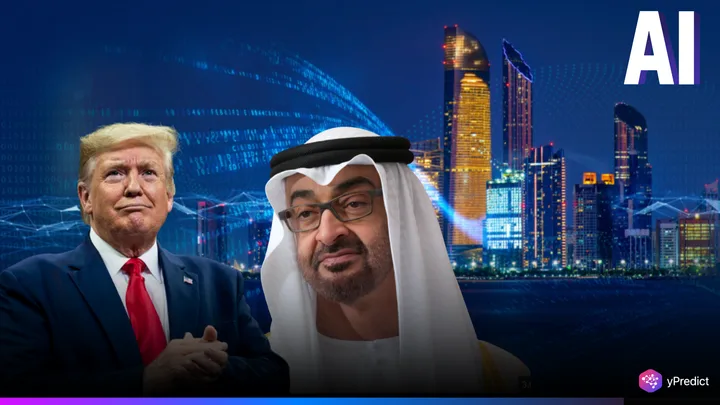
A major new U.S.-UAE agreement could reshape global AI infrastructure. During President Donald Trump’s visit to Abu Dhabi on Thursday, the U.S. and UAE announced a major AI partnership. They plan to build the largest AI-focused data center complex outside the United States. The project will begin with a 1-gigawatt center and eventually expand across 10 square miles. Once complete, it will reach 5 gigawatts of capacity, enough to power a major city. Abu Dhabi’s G42 will lead construction, while American tech firms will support operations and services. The deal reflects a broader push to expand U.S. cloud and AI influence across the Middle East and Global South.
U.S. Tech Stack Meets Gulf Ambition in Landmark Data Center Project
At the heart of this partnership is an ambitious build-out: a massive AI data campus in Abu Dhabi. Designed by state-backed Emirati firm G42, the facility will be operated by U.S. companies, including cloud providers and chipmakers. The site is set to handle cutting-edge AI workloads, training large language models, and powering regional cloud services. Though no companies were officially named, Nvidia CEO Jensen Huang was seen with Trump and UAE leaders. That sparked speculation that Nvidia’s H100 chips could power the new facilities. U.S. Commerce Secretary Howard Lutnick called the agreement “a milestone in achieving President Trump’s vision for U.S. AI dominance.”
Growth and Geopolitics: The Promise and Risk of AI in the Gulf
The project comes with major implications and some concerns. The UAE could import up to 500,000 advanced Nvidia chips each year starting in 2025. Such access would likely have faced restrictions under the previous U.S. administration. This shift has reignited debate about balancing tech exports and national security. China’s presence in the region remains a concern for many U.S. officials.
While G42 has sold off some Chinese partnerships, its past ties with Huawei still raise questions.
Both countries insist that U.S. companies will manage data flow and enforce security standards.
“This deal aligns our AI future with our most trusted partner,” said UAE Minister of Education Sarah Al Amiri.
Will the U.S.-UAE AI Pact Redefine Global Tech Alliances?
This agreement could signal a turning point in global AI Diplomacy. The project combines American technology with Emirati ambition to expand AI infrastructure beyond U.S. borders. In return, the UAE will build or fund similarly sized data centers inside the United States. This creates a two-way partnership that shares AI infrastructure and technical power. The deal also includes cooperation on cybersecurity, AI regulation, and cloud adoption through companies like Amazon Web Services and Qualcomm. However, some experts warn that this increased openness might create new avenues for tech leakage to rivals like China. For now, U.S. officials say strict safeguards will ensure American control.
Can Strategic AI Partnerships Avoid a New Tech Cold War?
The U.S.-UAE AI infrastructure agreement opens up new global possibilities, but it also revives old questions. Can AI cooperation work in regions with competing alliances? Will tighter U.S. oversight clash with the UAE’s ties to China? The agreement could speed up AI access in underserved regions worldwide. But it also forces new questions about trust, tech tradeoffs, and global regulation. AI is now central to both economic strength and military readiness. Future deals will likely face even greater scrutiny from lawmakers and security experts. For now, the partnership signals both optimism and caution. It marks a bold step into a more complex and connected AI future.






